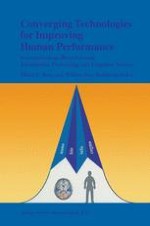M. C. Roco and W.S. Bainbridge In the early decades of the 21st century, concentrated efforts can unify science based on the unity of nature, thereby advancing the combination of nanotechnology, biotechnology, information technology, and new technologies based in cognitive science. With proper attention to ethical issues and societal needs, converging in human abilities, societal technologies could achieve a tremendous improvement outcomes, the nation's productivity, and the quality of life. This is a broad, cross cutting, emerging and timely opportunity of interest to individuals, society and humanity in the long term. The phrase "convergent technologies" refers to the synergistic combination of four major "NBIC" (nano-bio-info-cogno) provinces of science and technology, each of which is currently progressing at a rapid rate: (a) nanoscience and nanotechnology; (b) biotechnology and biomedicine, including genetic engineering; (c) information technology, including advanced computing and communications; (d) cognitive science, including cognitive neuroscience. Timely and Broad Opportunity. Convergence of diverse technologies is based on material unity at the nanoscale and on technology integration from that scale.
